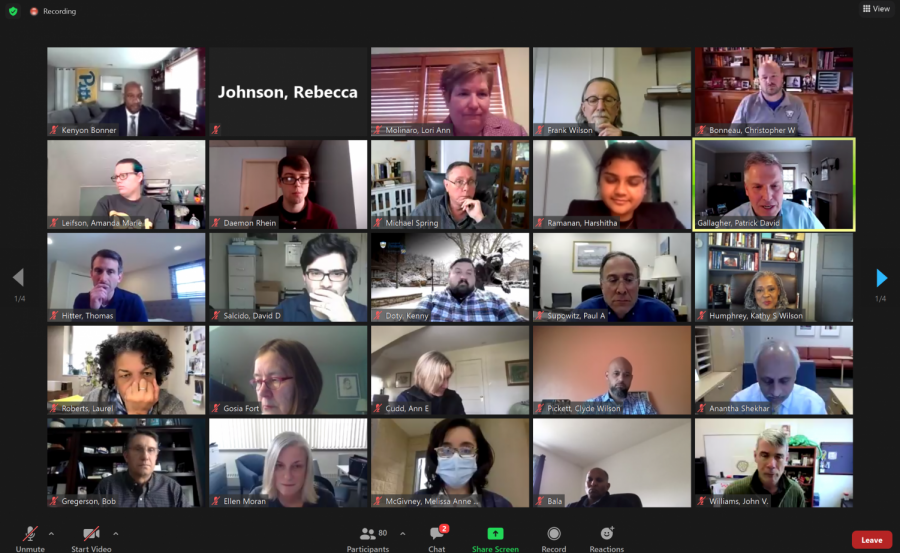‘We did well’: Pitt officials discuss COVID-19 response, vaccination efforts
Melissa McGivney, the associate dean for community partnerships at the School of Pharmacy, discussed the University’s vaccination efforts at Thursday afternoon’s Senate Council meeting hosted via Zoom. Other officials addressed Pitt’s COVID-19 response and graduation at the meeting.
April 23, 2021
All students should get the first dose of the COVID-19 vaccine even if they can’t get the second dose at the same location, according to Melissa McGivney, the associate dean for community partnerships at the School of Pharmacy.
“[Encourage] students to go ahead and get that first dose of that vaccine, keep their CDC card — we’re telling people take a photo of it, don’t post it on social media, but take a photo of it — keep it and we’re finding that many of the pharmacies across the country are able to offer second doses as well as local health departments,” McGivney said.
McGivney discussed the University’s vaccination efforts at Thursday afternoon’s Senate Council meeting hosted via Zoom. Other officials addressed Pitt’s COVID-19 response and graduation at the meeting.
McGivney also said Pitt has completed 26 COVID-19 clinics so far at the Petersen Events Center and in the community. She said Pitt has provided more than 15,000 doses of the vaccine — 10,000 first doses and 5,000 second doses. By the end of Pitt’s vaccination efforts, McGivney added, it will have fully vaccinated more than 10,000 people.
The University’s “big” vaccination efforts at the Petersen Events Center are soon ending, McGivney said. She said Pitt is opening a smaller clinic at the base of Nordenberg Hall starting next week. McGivney said the clinic — which will be inside the former AT&T store on Fifth Avenue — will have floor-to-ceiling windows and will be able to accommodate about 12 people every 30 minutes on a walk-in basis.
McGivney also listed possible symptoms following a vaccine. She said some symptoms can include headaches, tiredness, fever and chills, but that they’re “short-lived.” She added that a conversation about the effectiveness of vaccines is important at Pitt and across the country as the vaccination efforts turn to people who were more hesitant to get one.
Chancellor Patrick Gallagher briefly addressed mounting questions around the country about whether universities can require students to get a COVID-19 vaccine. Pitt’s Faculty Assembly introduced a proposal that required students to get one in order to participate in on-campus activities next fall, but no formal vote was taken. Gallagher said the decision isn’t “straightforward,” and Pitt hasn’t made any decisions yet.
“The best way to make all of those decisions as unimportant as possible is for everyone to get that shot,” Gallagher said. “But I do anticipate we’re going to be addressing that as the summer progresses, and we will be reaching out to our community, whether you’re here on campus or not, with updates on that.”
The Senate also talked about in-person commencement ceremonies, which are set to begin next week. Kathy Humphrey, the senior vice chancellor for engagement and secretary of the Board of Trustees, said 4,300 students have registered for the in-person ceremonies. Each student is permitted to bring two guests. Humphrey added that the commencement ceremonies at PNC Park will happen “rain or shine,” but Pitt will give families three hours notice of a cancellation if there’s a thunderstorm.
Gallagher also announced at the meeting that Pitt will not refill Humphrey’s position when she leaves this summer to take over as president of nearby Carlow University. He said the current deputy secretary of the board of trustees Rosalyn Jones will take the lead role, and that other offices that reported to Humphrey will go back to reporting to the chancellor — which was the previous model when Humphrey served as chief of staff to Gallagher. He said Pitt will start to separate the Community Engagement portion from the Office of Community and Governmental Relations as a separate program led by Lina Dostilio, the current associate vice chancellor for community engagement.
Officials also briefly touched upon Pitt’s COVID-19 response. Dr. John Williams, the head of the COVID-19 Medical Response Office, said Pitt “peaked” a couple of weeks ago with case numbers which prompted the move to the middle Elevated risk posture and the shelter in place. But he said since then the numbers “came down a lot.” Pitt added 13 new COVID-19 cases, composed of 12 students and one employee, between last Friday and Monday.
But Williams cautioned that not as many students are showing up for asymptomatic COVID-19 testing, there are low positive rates among those who do. Williams said overall the University is doing “well” and has learned a lot about COVID-19 control in the past year.
“We are now in shelter in place, we’re at the end of the term, so I think we’re doing well,” Williams said. “And you know, not ready to spike the football yet — we still have to get through the next couple of weeks and graduation — but we’re doing well.”
Gallagher thanked students for “persevering through this crazy year” and being willing to follow COVID-19 guidelines to make it through the pandemic.
“We did well overall, because of what the students did. And I just want to thank you for your partnership, being willing to change everything about life on college, and maybe even changing in ways that were not what you were expecting from this experience,” Gallagher said. “And just recognize that that sacrifice you’ve made, I think made it safer for everybody.”



